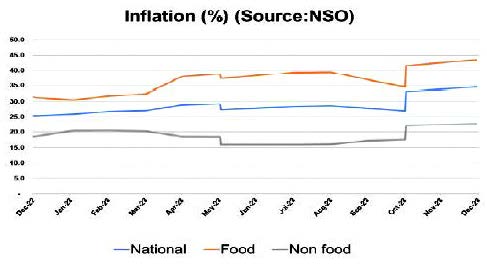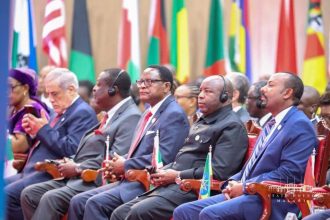AfDB cautions on monetary policy
Raising interest rates in African countries such as Malawi may have limited success in containing or reducing inflation because most countries on the continent face supply-side shocks, a report from the African Development Bank (AfDB)shows.
In the January 2024 issue of Africa’s Macroeconomic Performance and Outlook released last week, the continental bank noted that inflation remained elevated in some African countries despite central banks imposing high interest rates.

Since April 2022, the Reserve Bank of Malawi (RBM) has raised the policy rate by 1 200 basis points from 12 percent to 24 percent, representing an upward adjustment of 100 percent. However, over the same period, inflation has risen by 123 percent from 15.7 percent to 35 percent.
AfDB said it is important to note although the policy rate has more than doubled in the past two years, real interest rates remain negative, meaning they are higher than the inflation rate. The bank cautions this would further counteract the effects of monetary policy instruments.
Reads the report: “Low and negative real interest rates disincentivise domestic savings, and with national currencies weakening, households could use alternative assets, including foreign currency, as store of value, further undermining the efficacy of monetary policy transmission to combat inflation.”
AfDB, thus, urged member countries like Malawi to explore more innovative instruments to deal with the supply side factors driving the current wave of inflation amid concerns that “further upward adjustment in interest rates could increase the cost of credit disproportionately and impose a tax on growth”.
Reacting to the report, market analyst Bond Mtembezeka said the contractionary monetary policy adopted by the central bank has not worked because inflation in Malawi is largely driven by the exchange rate and the country’s heavy dependence on imports.
In a WhatsApp response, he said: “Exchange rates drive up the cost of production which has a strong pass through effect on the price of goods and services. Further, being a net importer, we import inflation further as well.”
RBM spokesperson Mark Lungu in an interview said acknowledged that supply-side constraints dampens the effectiveness of the central bank’s contractionary monetary policy, as such, called for collaboration between different stakeholders to bring down inflation to a manageable level.
He said: “RBM does its part to manage inflation from the demand side, there is a need for other key players on the supply side to play their meaningful role to unlock the structural issues that hinder the economy from boosting its supply.”
The RBM spokesperson further expressed optimism that the measures that the government has undertaken to improve agricultural production and diversify the economy will help bring down inflation in the medium to long term.
Economics Association of Malawi acting president Bertha Bangara-Chikadza urged the government to prioritise borrowing for investment and limit imports of goods that can be produced locally.”





